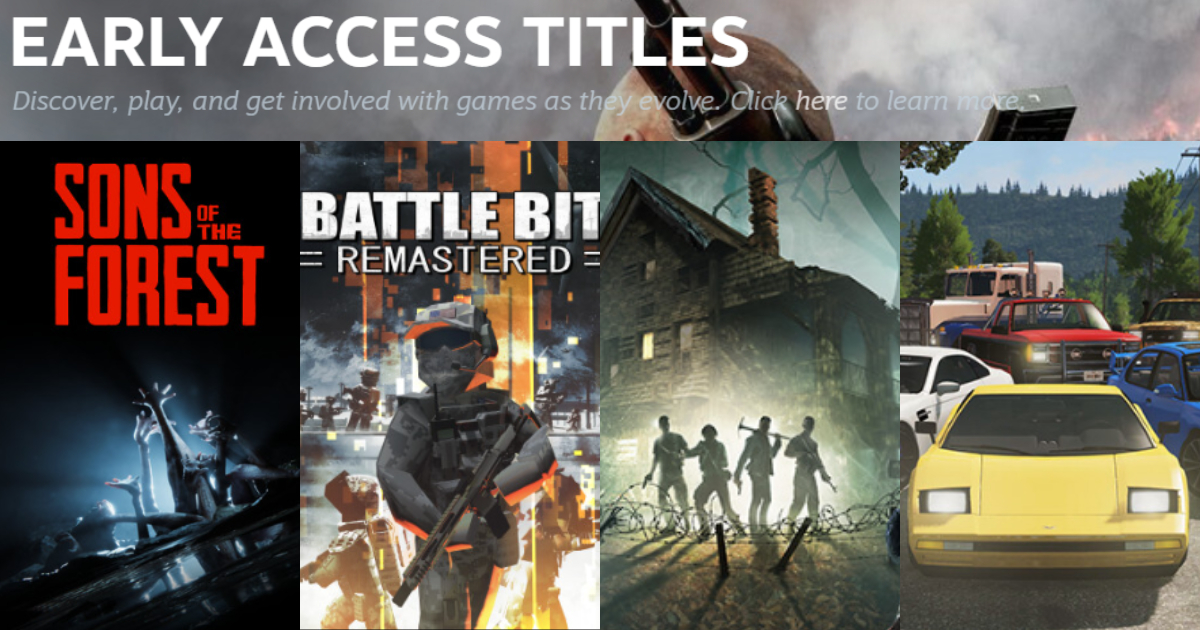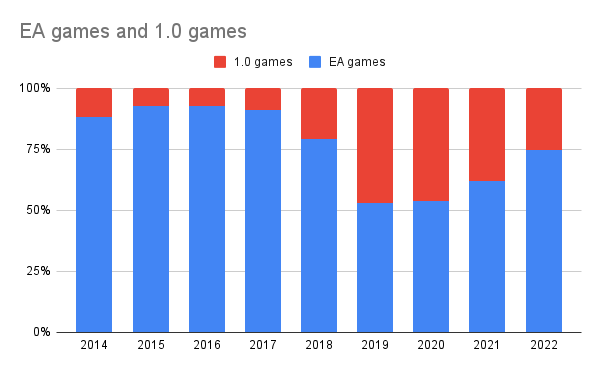Although we have seen numerous successful Early Access games, there is still a debate about whether all developers should take this approach. Game marketing expert Chris Zukowski tried to get an answer using the raw power of numbers.

For the latest How To Market A Game post, Zukowski decided to turn to some stats to test his theory that Early Access might be a bad idea for developers launching their first game. He used data from VG Insights to see the estimated revenue for all EA titles since 2019 and compare them to those that only had a normal launch.
And it turned out that Early Access actually might be a really great strategy, allowing game developers to get more visibility on Steam and, as a result, make more money.
- According to VG Insights data, the average estimated revenue for games with only a normal launch is $360,000, and the median is $613 (the huge gap is due to the fact that Steam “really favors the winners”, so it is better not to rely on averages).
- Early Access titles make $263,937 on average (the median is $847)
- The average revenue for games that survived EA and made it to the 1.0 launch is $523,000 (the median is $2,874).
The difference is there, but most games never get more than 10 reviews. That’s why Zukowski decided to only take titles with more than 100 reviews (“there is nothing magic about 100 reviews, I just picked a nice round number”) to sort out “hobbyist” projects.
While EA titles still have an advantage, the difference is a bit more ambiguous.

According to Zukowski, releasing version 1.0 after Early Access has several advantages over a normal launch:
- The game has two launches, which boosts visibility and also allows an additional email to wishlisters (one at EA launch and another at 1.0 launch);
- Devs start getting paid while their project is still in development, i.e. additional funding that some smaller creators may lack;
- Stronger community and more polished state (likely fewer bugs);
- Majority of EA games got abandoned prior to 1.0 launch, so titles that survive this selection usually perform well enough for their devs to finish them.
However, there is a serious downside. “I see EA like quick sand,” Zukowski noted. “If you don’t navigate your initial EA launch carefully, you are stuck: no sales, bad reviews, and those people who did buy it are constantly asking ‘where is my update? Why haven’t you updated your game? It has been 3 days!'”
Zukowski warns that when you launch a game in Early Access, you sign up for mandatory community management, which will basically become your second job.
Another major problem is that if EA runs poorly, a game becomes a dead weight for its developers. This spawns a tough choice (essentially, there is no safe option):
- Abandon the project (= angry players and damaged reputation);
- Finish it quickly and release with bugs or lack of content (= also angry players);
- Fund development with your own funds (= risk of running out of money).
On top of that, many players still have a prejudice against EA games, especially those from newer studios with no track record. The main reason is that from 2014 to 2017, Steam was flooded with poor-quality projects that never survived to the 1.0 launch.
Zukowski pointed out that 90% of games that had an EA launch in 2016 never made it to version 1.0. The situation has gotten significantly better, but the abandon rate is still quite high.

According to Zukowski, EA is about high risks and slightly higher rewards. Here is the main rule: “You should never choose the Early Access route because of money.”
“Don’t do an EA launch because your visibility is flat and you hope that an EA launch will improve your game’s marketing. It will not. EA Launch is the culmination of your visibility, not a catalyst,” Zukowski said, adding that many developers “don’t realize that the game’s EA launch is their launch.”
This is also something GameDiscoverCo’s Simon Carless pointed at, saying that “There’s no ‘magic 1.0 algorithm bullet’ on Steam.”
For more data and analysis on Early Access and 1.0 titles, read the full post on How To Market A Game.
